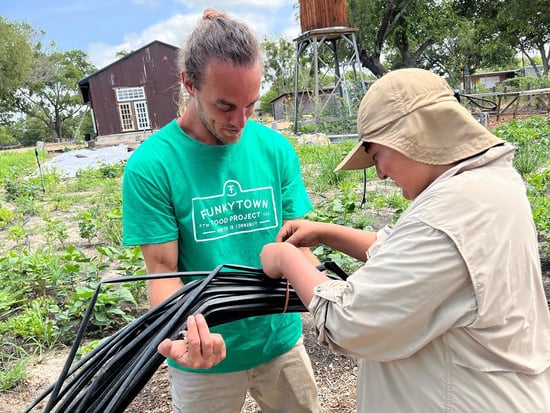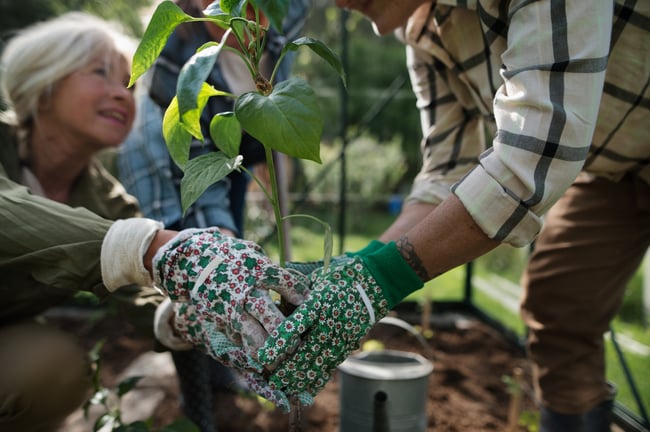Cort DeHart ’95 made a name for himself in the legal and corporate world — now he’s teaching core principles to young people about growing food and growing up.
Cort DeHart ’95 has certainly had a successful legal and corporate career. In 1995, he co-founded a law firm that would eventually become DeHart & Crockett, P.C., where he remained until 2009. He subsequently served as president of multiple companies, including Digital Recognition Network, a company known for its industry-leading location intelligence technology.
Many would consider just putting their feet up at this point after approaching the bench and the boardroom as many times as he had. But DeHart started to think about the many different definitions of success.
“Many work hard in a career to try to control their destiny and I certainly did at times, too,” he said. “But I began thinking about how I wanted to spend my remaining years on this earth. At the same time, I began lamenting the increasing lack of civility in the conversations people were having, whether it was on politics or other issues, and it kickstarted me into wanting to find a way to reconnect with people. Then I discovered the writings of Wendell Berry, an agrarian writer who wrote about the importance of community, and the role of small farms play in making them healthy. One essay spoke about what you can do when you feel helpless in the face of seemingly insurmountable problems. His advice was to “think little.” Before rushing to join some new organization or movement, look in your own backyard and at your own life and see what you can do right now, with what you have – on your own.”
What DeHart chose to do meant letting go of the need to control the outcome and instead trusting the process while relying on others and at times getting out of the way.
The Fort Worth-based FunkyTown Food Project, which presently sits on DeHart’s eight-acre Conundrum Farms, is a farm-based education program for high school students to work the land while also working on themselves. “Yes, we’re growing healthy foods, but we’re also trying to grow healthy human beings,” DeHart said.
“Farming is a great way to do that. You can learn a lot about yourself from farming, including something that sometimes can be rare these days, patience. But you see the results of consistent work and paying attention to the little things. You plant a seed, a few days go by, and it sprouts, then more time goes by, and you see the produce. When you look back you can see that not only have you grown something that can feed you and your community, but you have also been nourished by the process of farming itself.”

High school students have participated for the last two summers in a paid six-week program, which sees them work around 32 hours a week. The mornings are spent in the field learning about farming, healthy food systems, and food access, while the afternoons are spent learning about how to become productive members and leaders of their communities.
“We want to give these students a well-rounded experiential education when it comes to food and food access,” said DeHart. “Some days we go off-site and do community work at a food pantry or build raised beds for a community garden.”
But DeHart, whose grandfather was a farmer, sees a major part of the program is about students learning from each other, growing their own community, and bolstering their communication and teamwork skills.
“We strive for a very diverse class of interns, kids who might not otherwise hang out together, he said. “You see these strangers become close friends, begin to stand up for each other and, by the end, they have a really close-knit tribe. It’s a great thing to see. They learn to learn from each other and that we are all much more alike than different. These are the lessons that will help heal our communities.”
DeHart has watched some participants go on to college — some even using the experience in their college essays — and looks forward to seeing what they’ll accomplish in their futures.
“While they are working with land, they are learning life skills, which we hope will give them a better sense of how to be thriving adults. You also see them gain confidence, as the program gives them a sense of pride and that feeling of accomplishment that can improve their self-esteem. As our Executive Director likes to say, ‘Everything good is uphill’.”
(Fort) Worthwhile
Outwardly, everything means much more to DeHart to do this in Fort Worth, graduating from high school himself in Cowtown. He would return for his law school years at what is now Texas A&M School of Law. “Fort Worth is an amazing, tight-knit community that has such a rich history, stands with each other, and supports each other,” he said. “There are so many people in this city making a difference.”
“I can’t tell you how much what I learned at law school has helped me throughout life,” he said. “The problem-solving skills and ability to see different perspectives changed the way I thought and approached life, law, business, and now this. You really learn to think creatively to find solutions to difficult problems. It’s not an accident the farm is called Conundrum Farms.”
DeHart has many hopes for the FunkyTown Food Project: that it will feed even more people who go without, that it will help more young people become better citizens and forge lasting friendships, and that it will continue to be a quality symbol of what Fort Worth is all about community.
“When starting something like this, you can only hope it will catch on,” he said. “I see the enthusiasm people have for it and I feel very fortunate to be a part of it. We have prepared the soil, planted the seeds and now we are just trying to nurture it to grow a better community.”
More information, including volunteer and support efforts, can be found on the FunkyTown Food Project website or the Conundrum Farms website.
